Sw Deva Sarlo

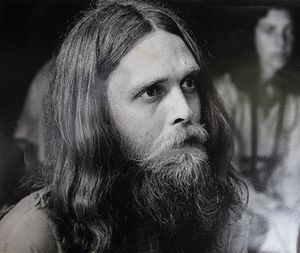
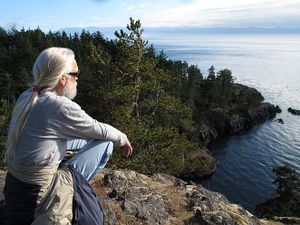
After a long time in Vancouver, moved to Vancouver Island in 2008, in a bucolic rustic paradise for as long as i can "manage." Chopping wood, etc.
Since 2013, plunged into wiki editing big-time; since 2014, working especially with Osho's Hindi books, where there is still lots to learn and unlearn ...
Since 2021, moving more into sannyas history, such as it may have been ... the blessings continue.
Love, Sarlo
A Personal History, for those so inclined:
Sannyas Jun 1978 in Pune (Madman's Guide), 11 x groups, back to Vancouver to get more money to "stay forever", returning in Aug '79 (Upset Sutra) to do a few more groups then work. My luck o' th' draw: Guard, getting to challenge (or not) people's perceived right to pass, and being on call for whatever, and watching it all, not least a reluctance to challenge.
The "reluctance to challenge" was a fairly cool device for all concerned. In fact, most jobs in the ashram had a component whereby the needs of the job might at times mean that the otherwise lowly position would assign the holder of that position a certain amount of power over others, even those who would normally be "above" them in most other situations. Such as a kitchen worker who would close the line twenty minutes before discourse and stand firm against all importuning "important" people who would demand a last piece of toast.
That said, guarding had more scope than most jobs for saying no and otherwise exploring the use of authority with strangers and not-so-strangers, so i got to explore an area of some discomfort. (Which was certainly the case with most ashram jobs; we were not there to be comfortable.) Telling people they couldn't pass did not come easily and naturally. What to say to the woman who lived at #122 for whom the gate was locked for the 45 minutes of energy darshan and who just wanted to get quietly to her room and rest, and could have entered easily if she had just come a few minutes earlier? The word was "No", but i felt like a heartless torturer and an obedient slave to an inhuman rulebook saying it.
Very good then, feel like a heartless torturer and obedient slave, and see where that takes you. It's all processing, grist for the mill. And no real harm done. I told her if she could manage to climb over the wall (not easy), i wouldn't interfere. She waited for forty minutes until i opened the gate. That was her device.
Guarding did have some perks to compensate for the suffering of saying no. All workers got to go to darshan every three or four weeks. Guards were among the lucky crew who also got to go occasionally to be "lifters" during energy darshan, ie to carry those who were unable to make their own way to the back of the hall after being zapped in their personal energy darshan. Perhaps this was a compensation for being male in a system where virtually everything was run by women. (More on that later.)
After a slow, sleepy start (five months at #122), i began to "rise in the ranks" to the back gate, but not for long. An intruder managed to sneak into Lao Tzu, getting to Osho's bedroom window during the night while the guard there was sleeping. The unfortunate guard got sent back to the back gate and i got bounced back to 122.
The intrusion heralded a new era in guarddom though. The guard dept got split into the elite, martial-arts-handy Samurais, who guarded Lao Tzu, and the more laid-back "Krishna guards" (named for Sw Anand Krishna), who guarded everything else.
This split occurred in Feb 1980. Everything after that in guardland became more serious, though naturally we did our best not to take it too seriously. But really, Osho had always to change or escalate the situations through which we would have to pass, so as to continually push us into seeing and processing some inner obstacle or inner strength on the path to truth / light / love. The escalation of seriousness of course came to a grand climax at The Ranch. More about that when we get to it.
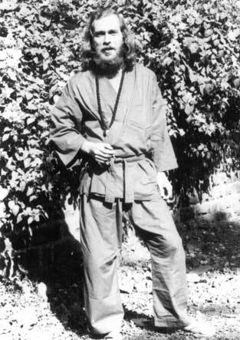
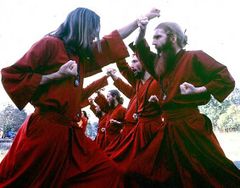
In guardland, we soon got uniforms. They were spiffy and classy in their way but they were still uniforms and as such inspired currents of anti-uniformity that lay latently or not-so-latently in many of us. They were a plain maroon, cut in a martial-arts-inspired way: a wide-open jacket with stiff lapels (edges or whatever you might call them) that could be closed with a wide cloth belt, no metal, just tie a knot. Pants were a kind of capacious pajama with one atrocious ill-considered feature: They were supposedly designed to allow freedom of movement so that one could actually do martial arts but the crotch was so low, it actually inhibited full movement. (To imagine how this might be so, just consider an exaggerated possibility, of the crotch going as low as the knees, and with your knees held together, make a great kick.)
While we're here, it will be good to mention Bodhena, who was a guard too. He has managed to get a worthy book together which includes lots of memories of those days in Pune One. The two pics at right are samples taken from excerpts of his book put up at Osho News. Links to the collected excerpts are here.
We also had to practice at martial arts, mainly aikido and tae-kwon-do, which were not well-suited to my laid-back self-image. In those practice sessions we were re-united with our former brethren the samurais, but they were gung-ho, already hot-shot practitioners while most of the Krishna guards were not. So off we went kicking and punching at the air, shouting Huh! and Zah! as enthusiastically as possible. It was at one of these practice sessions that Vimalkirti burst a blood vessel in his brain, leading him to leave his body a week later. I was not at that one.
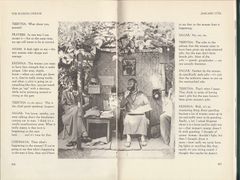
I was not back at 122 for long before my "career track" resumed. I was moved to a number of posts, then got to be a "rounder", someone who would go 'round and give guards who could not leave their posts a pee and tea break. While not doing this, i would sit at Hotei, the thatched-roof open hut at the end of Buddha Hall where people would pass into the less public part of the ashram (if they were allowed). This modest hut also served as Krishna's office, so i would help with some of his paper work, which was growing as the ashram grew.
This paper work entailed lots of tasks, some not so little. The two biggest ones were maintaining the "bannee" list and scheduling. "Bannees" were those not allowed in the ashram for one reason or another. The ashram aimed to be as open and porous as possible, to allow the free flow of visitors who could respect the space and were there to grow and expand their inner horizons, but the buddhafield did attract the whole spectrum from devotees to sincere seekers to the curious, intrusive, abusive and criminal elements. And there were those who were more or less sincere, but their fragile or unstable psyches could not allow them to stay within the ashram's mostly permissive and flexible limits.
One of the stricter limits was keeping the silence in Buddha Hall when Osho was speaking. The drill there was "no disturbances". Period. No shouting, coughing or even much beyond modest shuffling was tolerated. One offense would get you escorted out of Buddha Hall. Repeated offenses would get you in the bannee book. One such person to whom this happened was Ma Deva Eva, who started going through a phase when she could not stay quiet in Buddha Hall. Her photograph was duly taken, a few bio-details entered in the book, all the guards became familiar with her "case" and she was out.
But this was not the end of her story. Soon enough, maybe after a week or so, she talked to someone, Arup, Sheela or whoever, and was allowed back in again, then she was working, and within days of being banned, was an ashram resident. Guards almost got whiplash from trying to keep track of her status, but such were the possibilities.
Eva's name may not be recognizable to many but she later arrived at a relatively high profile as the Swan Lady, caring for the ashram's commune's resort's resident free-roaming swans, and after that becoming the fairly well-known spiritual teacher Dolano.
The biggest ongoing paper work was scheduling. As can be imagined, more than a few guard posts had to be maintained 24/7, and most of the rest from before sunrise to well into the evening. All were operative during Osho's discourses, so some guards had to miss them. Scheduling was a way to ensure that these burdens could be distributed fairly. And people would get sick, get moved to other posts, other departments ... there was always something to do in that area, and Krishna soon was happy to leave it to me.
. . . . .
Most of the buildings in the Pune One ashram were named by Osho for masters in all traditions he has talked about. The guard hut, Hotei, was no exception. In addition, there was Manjushri, a little-known shed in the corner of the ashram on the front road next to Sunderban Hotel, where the guards' lockers were. So let us take a walk in the garden of the possible esoteric significance of these names; perhaps such an exploration might shed some light on those who worked there, peut-être moi, or so it may please me to think.
Manjushri was Gautam Buddha's first enlightened disciple. One story about him that Osho has told repeatedly is that he always sat silently under a tree, and when he became enlightened, the tree showered him with flowers, out of season. He is said to have come to a natural awakening, as a natural man, and inspired a similarly natural Chinese monk, Tanka Tennen, to climb on his statue to the smiling approval of Ma Tzu, a master whose temple he was visiting.
Another repeated story is that he had been a well-known philosopher when he came to Buddha, coming in one version with a thousand of his own disciples. He wanted to ask Buddha lots of questions and debate and so on but Buddha insisted he just sit in his presence for two years and then he could ask all he wanted. After those two years he was feeling so silent and blissful he didn't bother, nor had he kept track of the time, but Buddha had and asked him when the two years were up to ask his questions. A deal is a deal. Of course he had no questions and when Buddha would impose the same condition on later arrivals, he would laugh uproariously telling them to ask now, don't wait, this was a trick!
Then there is "Manjushri's sword" ... He was said to be so fierce and uncompromising that when Buddha would send someone to him for straightening out, he acquired a reputation as Buddha's metaphorical sword which persisted in Buddhist lore down through the centuries.
Still, Manjushri is little known outside of well-schooled Buddhist circles, so he only got a shed. The hut named for Hotei was even more modest but it was after all the center of guarding activities and admin, perhaps suggesting Hotei was more ... what, symbolic? representative? or somehow aligned with the essence of guarding. So who was he and how does he fit in Osho's Grand Vision?
Hotei was a unique master, as are they all and as are we all for that matter, but that's another story ... Osho often speaks of him as Japanese but in fact he seems to have lived sometime in the 700-900 CE era in China. He is one of the most undocumented of all the Chan masters, because he had no conceptual teaching, fixed address or lineage, before or after. He did not fit into any definable categories. He wandered from village to village with an enormous bag full of gifts -- toys, trinkets, candy -- for the local children and his teaching consisted mainly of laughter. He is the original "laughing Buddha", fat and jolly.
Many of Osho's mentions of Hotei have to do with his tireless laughter. He started laughing when, finding his whole effort to become enlightened absurd, he became enlightened and never stopped, in most versions.
- His laughter was so contagious that whosoever heard it would start laughing. Soon the whole marketplace would be laughing; crowds would gather and laugh and they would ask him, "Just give us a few instructions".
- He would say, "Nothing more, this is enough. If you can laugh, if you can laugh totally, it is meditation".
- Laughter was his device. It is said many people became enlightened through Hotei's laughter. That was his only meditation: to laugh and help people laugh. ~ from Be Still and Know, ch 5
And distributing treats to children ... Most of us are scarcely more mature than children, but are not as innocent, so we cannot appreciate these small things in the total way that children do. In that regard, he had a special "ministry" to children:
- It is said that each village through which Hotei had passed -- after his death, in all those villages saints started springing up. Those small children were now becoming mature, young people. Hotei had not said anything to them, but he must have infected them in some way. He was contagious, and children are most impressionable. ~ from From Darkness to Light, ch 18.
And his begging has to be mentioned. Hotei would acquire his bag full of treats by hitting up merchants for stuff for the children of the next village. And he used to ask for a penny -- ie the lowest local unit of currency -- playfully but somewhat aggressively from everyone. The point of this was not for himself but for the potential giver, to experience the joy of giving openly even something so small.
So is this what guarding was all about? Good luck with that.
I mentioned above the fact that most everything in Pune One was run by women, with the guards a fairly prominent exception. That could not last, so in due course Krishna was made second-in-command to Ma Yoga Nirmal, who he said was probably the best (least intrusive, crazy and power-trippy) choice that could have happened, given that a change was going to happen. See also "Women in charge" for more on all that in general.
Krishna did not seem to mind being "demoted". He was in any case already "under" the women at the top, even as a department head, so one more hardly made a difference if she was not egregiously trippy, and in the event, Nirmal proved to be a gentle manager, not there to use her "underlings" to process her issues. Change happened, but in organic ways, that seemed more an unfolding play than the intrusion of an ego. We got female guards for instance, a welcome addition. They were always few in number but added greatly to the social dynamics, both within the department and when interacting with the public in the course of their work.
More about Nirmal later when we get to the Ranch.
I wanna talk here about a guarding incident that is at once personal, ie an idiosyncratic, unique story that happened to moi in the course of guarding duties, and universal, in that it was an expression of a clash of archetypal energies and a variation on the theme of of illustrating HOW OSHO WORKS. (Well, yeah, everybody's got their story, and all it is is some general principle finding a particular expression. It's no big deal, and it's the biggest deal ever, and furthermore ...)
So anyway, i had a girlfriend at the time, and we were nearing the end of our relationship-ola. I was guarding at the back gate and had to pay attention and be alert about people passing, and she came along with some fixation about her "best" dress, that had somehow got some turps (turpentine) spilled on it and it might be ruined, and could i help her somehow with it, etc etc, fairly importuning, and i'm like No, not now, and you can deal with it yourself, don't bug me, etc.
This was in the mid-to-late afternoon. Then an almost dreamlike quality enters into the story, because somehow it is later, dark, and early evening, and i am at Hotei, again guarding, and now she shows up wearing that tight-fitting, expensive best dress. I have no idea how she dealt with the turps but there is still somehow a problem, she still needs to get my attention for something, i can't remember what ...
Finally, she gets my attention big-time by slapping my balls, hard enough to be quite painful, not hard enough to be incapacitating. What am i to do with this woman? I cannot leave my post, have to keep an eye on traffic, which is fortunately not much, possibly it is Energy Darshan time. I grab her arms and we stare at each other for a moment, she asks, "What are you going to do?" in a terrified way. Well, i don't know, but suddenly inspiration estrikes and i rip open the top of her expensive best dress, now certifiably ruined and no longer able to contain her now tumbling out large breasts.
Now she has a good reason to get lost. but it can't happen immediately, since my action has unfortunately broken her mala too, so there we are, fairly ignominiously gathering the beads in the dark. After a couple of minutes of that, with some hopefully discreet help from my flashlight, she finally leaves. She can't go home, as her room is in #70, but she can wait in a friend's room until after darshan, when there will be lots of people to accompany her.
This is not quite the end of the story, though it's the end of the relationship. The next day we are called in to see Sheela, who chides us both, ex-gf as an ashram resident, me as a guard representing the ashram. I should have kept my cool, yes, but under Sheela's criticisms there is a chuckling amusement.
Yes, and How Osho Works (HOW) ... ? Ha ha! There are a number of elements. My now ex-girlfriend and i remained friends, suggesting that part of the underlying HOW is that such incidents need not be taken on as baggage to be carried forever in the form of resentments. That take-away is present in therapy groups as well. Participants understand they are there for a number of reasons, among which to act out their roiling stuff, possibly stimulating others' roiling stuff, and in all the acting out, some pretty wild stuff may happen, in the service of raising awareness and disidentifying from previously, usually unconsciously held obstacles to growth and awareness. Guilt and should(-not)s fall by the wayside.
Many of these things can more easily happen in groups but not everyone goes through the groups process, and groups in any case have their limitations. Ambition and macro-scale power issues for example cannot be brought up and resolved in groups since the resonating factors cannot easily be simulated there, beyond one-to-one exercises like master-slave acting-out games. For these and other social issues, there's nothing like Osho Real Life®.
For instance, The Ranch. It was not ostensibly set up as a Group. It was a collective project, variously "an experiment to provoke God", a way to demonstrate to the world the power of selfless collective action, via greening the desert and building a city, or an expression of the originality and daring of Osho's vision. Osho was disengaged and ...
But i'm getting ahead of myself here, so back to Pune for a while.
. . . More to come . . .
Contact Details
- address
- Vancouver Island
- Canada
- phones
- Phone:
- Mobile:
- Skype:
- sarlo9
 protonmail.com
protonmail.com
- websites
- Mueslings
- Songs in the Key of Osho
- Sarlo's Guru Rating Service (the only reason i am listed among the Satsang crowd. I am not a teacher or enlightened.)
- Zen Masters Lineage Chart (all the Zen/Chan masters Osho has talked about)
